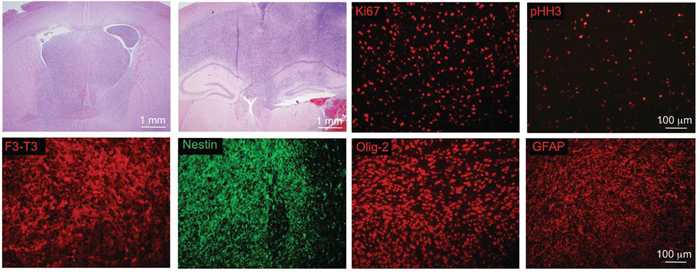News
Study Identifies a Genetic Cause of Glioblastoma
Representative microphotographs of hematoxylin and eosin staining of advanced FGFR3-TACC3-shp53–generated tumors show histological features of high-grade glioma.
A new paper published by Columbia University Medical Center researchers in the journal Science has determined that some cases of glioblastoma, the most aggressive form of primary brain cancer, result from the fusion of the genes FGFR and TACC. Raul Rabadan, a co-senior author on the study, led efforts to identify these genes by using quantitative methods to analyze the glioblastoma genome from nine patients, and then compare these results with more than 300 genomes from the Cancer Genome Atlas project.
The collaboration with cancer genomics expert Antonio Iavarone and co-senior author Anna Lasorella found that the protein produced by the FGFR-TACC fusion disrupts the mitotic spindle (the cellular structure that guides mitosis) and causes aneuploidy, an uneven distribution of chromosomes that causes tumorigenesis. The researchers also found that drugs that target this aberration can dramatically slow the growth of tumors in mice, suggesting a potential therapeutic target.
"This work is the result of an ongoing collaboration between a traditional and a computational lab. The synergy between the two approaches allows us to tackle complex biological problems in a high-throughput fashion, providing a global view to the genome of glioblastoma," said Dr. Rabadan. For more information about the study, read the press release at Columbia University Medical Center.
Dr. Rabadan is an associate professor of biomedical informatics with appointments in the Center for Computational Biology and Bioinformatics (C2B2) and the Columbia Initiative in Systems Biology. C2B2 graduate students Joseph Minhow Chan, Jonathan Reichel, and Eric Minwei Liu were also involved in performing the computational analysis in this study.
— Chris Williams
Related publication
Singh D, Chan JM, Zoppoli P, Niola F, Sullivan R, Castano A, Liu EM, Reichel J, Porrati P, Pellegatta S, Qiu K, Gao Z, Ceccarelli M, Riccardi R, Brat DJ, Guha A, Aldape K, Golfinos JG, Zagzag D, Mikkelsen T, Finocchiaro G, Lasorella A, Rabadan R, Iavarone A. Transforming fusions of FGFR and TACC genes in human glioblastoma. Science. 2012 Sep 7;337(6099):1231-5.
